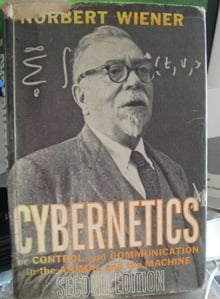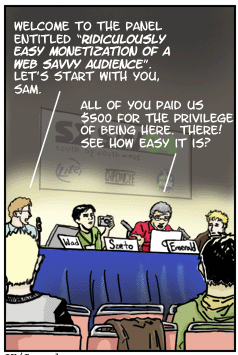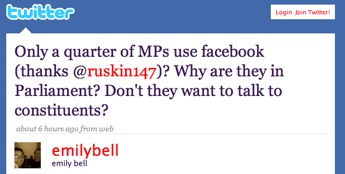Original URL: https://www.theregister.com/2009/02/24/james_harkin_cyburbia_interview/
'Like pedos in a playground' - the media and Web 2.0
James Harkin on cybernetic silliness
Posted in Legal, 24th February 2009 14:10 GMT
Cyburbia Don't judge a book by the title. Especially if the title is something like Cyburbia. James Harkin, who worked with Adam Curtis on The Trap, has produced the first proper full-length critique of Web 2.0 - tracing the daftness back to the cybernetics pioneers of the 1940s.
It's odd that something with so much hype as Web 2.0 has received so little intelligent criticism. Half of Nick Carr's The Big Switch, looked at the social and psychological implications, and he's following up at length in The Shallows.
But Cyburbia takes a different approach. By looking at the mania for feedback in a historical context, Harkin finds a common thread in subjects as diverse as military strategy, TV shows like Lost, as well as the interwebs.
It's very entertaining. James adapted a highlight for us here yesterday, and as promised, here's a conversation from last week.
We're used to cyber-everything but can you define cybernetics for us?
There are a lot of definitions but the simple idea I use is this idea that what distinguishes human beings, or what' smost important about humans, is that they exist on a continuous information loop defined by a constant stream of messages we're sending or receiving.
Now you can interpret the world in that way - me picking up a glass, say - but it is just a metaphor. The story of my book is how this metaphor, created by Norbert Wiener, because of its beauty, became the inspiration for a new medium and influencing how we live. It's given rise to all this incredible technology, but the idea of fitting ourselves into that mould will mean we're the losers.
The central image of the book is Cyburbia, this strange alternate world where we watch each other and the minutiae of each others' lives.
You might have stared out of your window in suburbia in the 1950s and seen a few people across the street, but now you can stare at millions of other people. The danger is that when you spend all your time deciphering what other people are up to, you never get around to doing something original on your own, because you're so swamped by opportunities to go onto other people's lives on blogs, social networks and Twitter.
Did you start off with cybernetics and then see parallels around us today, or did you start with Web 2.0 and trace it back?
I started off with the image of Cyburbia because I liked it, the image of people retreating from the world and staring at other people's lives. Now that's a nice image but it doesn't really explain a lot .So I began to trace it back to first Stewart Brand and then back to Norbert Wiener, a brilliant polymathic genius. I traced it back to the hippies then realised it goes quite far back beyond them.

Now I'm not arguing people are stupid or lazy if they do that - but there's an electronic peer pressure online. Academic studies that have been done by people who are very sympathetic to Web 2.0 and networks, people like Clay Shirky and Duncan Watts, show that the whole decision making process tends to become a robotic routine. One person makes a decision, and everyone else falls in line.
One aspect of the suburbia of the 1950s we see online is the conformism. This is incredibly ironic, because this medium was set up, for political reasons, to be incredibly individualistic and creative and non-conformist.
“ I first wrote about Second Life because I was sick of reading utter rubbish. ”
What I like about the book is that it doesn't fall into the trap of responding to utopianism with a dystopianism: that we're all doomed. That's a really common response, but people are intelligent, and discerning about technology. How do you resolve this then?
At the risk of sounding dreadfully like Marshall McLuhan, people haven't quite understood it as a medium yet. They've become so focussed on the idea that we're "freeing ourselves from the authority of the 'mainstream media", that we think that pressing buttons on a computer to talk to your neighbour is an authentic way of communicating. It's not.
The net is a medium like any other and has its biases, like any other. The biases are different.
The problem people have is that they're reluctant to describe it as a medium - they see it as a political idea, not a medium. So circumventing the mainstream media is not in itself authentic.
As you know, Andrew, if you criticise Web 2.0, people get offended. It's peculiar that they should get offended: you're criticising a medium. What they see is you criticising a groundswell of popular democracy, a movement, which it isn't at all. It's a bunch of machines.
Why people go bonkers
There's an odd aspect to cybernetic ideas a few of us have noticed, which is that some people who adopt them go off the deep end, and lose their minds. They dive in completely. They really lose their sense of self.
If you're engaging with the internet gurus who are very evangelical about Web 2.0 you'll hear a very good argument. And that's for the first time in history, millions of people around the world can have a voice. They can input all their thoughts into this system, and people can read them unmediated by anyone. Now, that's interesting, and it's a good and a challenging argument. But if you stop and think about it for a second, it's also wrong.
“The evangelists are simply wandering about waving empty books, saying 'Look, a book! How incredible. Pay me fifteen grand to talk about an empty book.”
It's wrong in an instructive way. To confuse any kind of democratic movement with typing words into an electronic machine which no one may ever read is really quite insulting. Given the history of modern democracy - everything from the French Revolution to the Civil Rights movement, to the Miners' Strike - to say that 'this is the first time people have had a voice' actually tells you a great deal about the lack of understanding the Web 2.0 people have.

Yeah, I first came across six years ago with the bloggers Googlewashing. They replaced a real political movement with a synthetic one. I thought they'd be a bit embarrased by this, but they couldn't see why people who had gone on marches against the Iraq invasion were pissed off with them.
It's scary. It's not pedantic to say if you can confuse the ability to type things into a blog no one will ever read with a voice, then something is deeply wrong with your political philosophy.
People who are being critical of Web 2.0 and this constant and continuous flow have a difficult time of it. It looks like you're pissing on someone else's parade. But I think there are serious and important arguments, here. The intellectual justifications that have been made by internet gurus are simply wrong.
And these are people who are being paid large amounts of money by companies to reorganise how the rest of us work.
Jaron Lanier [El Reg interview] suggested a reason for people going bonkers. He picked out neo-Darwinism as an example of a cybernetic idea that prompts this. The belief ".. that what Darwin described in biology, or something like it, is in fact also the singular, superior description of all creativity and culture" as an example of cybernetic totalism. This is a hole Richard Dawkins fell into.
I'm not an expert on Dawkins, but I can argue that part of my story is a sort of tragi-heroic story. It's a story about people who, over the last 60 years, have been trying so hard to implant themselves into a network. They very much wanted to become a node in the network, because they saw the network as being so much more powerful. In doing so, they lost their sense of human-ness.
But the network isn't as powerful as the adverts suggest. Human-ness is infinitely more powerful than an algorithm.
It's similar to the Singularity idea, where we weld ourselves into a cybernetic system, and in about 2040, or whenever it's supposed to be, we disappear like a puff of smoke.
“If you're a journalist in Fleet Street or the BBC it's difficult to be critical, because these commands come on down from on high.”
Technology should be so much better. The web has hardly started, really. But only the new priesthood of web designers are allowed to criticise it, or make improvements. There is a grain of truth in what the evangelists say, it's the mountain of crap they've piled on top of it that's the problem.
The evangelists are simply wandering about waving empty books, saying "Look, a book! How incredible. Pay me fifteen grand to talk about an empty book."
It's a transitional period. Even skeptics like us need to emphasise the positive.
'Why Not?' Isn't An Answer
I've done that for years by advocating legal, licensed P2P file sharing, which I find almost everyone except a few activists would to have at least like to have the choice to use. Most technology utopians hate it though because it's an admission of failure. Free music is about the only real 'success' the nets have delivered.
There's another view of Web 2.0 evangelists which I call 'Why not?' For example, 'Why not turn up at Grand Central Station wearing underpants in a big Flash Mob?'
But I don't think 'Why Not?' is good enough. Things need to have a purpose. If you have a project or a purpose, you can use the medium to achieve that. With no ideas, no project, you have nothing. The evangelists simply believe can use this metaphysical glow of this medium to woo people.
People forget the world's first Flash Mob in 2003, organised by Bill Wasik, was a joke. It was a joke on the gullibility of New York hipsters who would react to any kind of electronic information, and do anything you told them.
What's fascinating is that the 'Why Not?' ethos of Web 2.0 people started as a joke against them.

Web 2.0 people don't do jokes. Cannot compute. Now Linus Torvalds, the guy who started Linux, likes to say that technology doesn't change people, people change the technology. Again, isn't there a risk over-estimating some of the effects of technology?
McLuhan's argument was that media give rise to everything, that media is the root of modern life. Obviously that isn't true, and I'd never argue that. But it has an effect. Moving from oral storytelling to reading books by candle light did change things socially. It's important to recognise that.
The oral tradition changed but I can't buy that the human appetite for hearing a story diminished - we love stories more than ever probably, they just come in so many different forms.
People want zig-zaggy stories now. If we can discuss it without surrendering to it, we can find new ways of telling stories that baffle people, knock them off balance, and get them engaged. That's good. But Web 2.0 is antithetical to a real understanding of what media can do to culture, because all it says is let's surrender to the medium, and do whatever it wants to do.
When you look around you though, the best cultural operators are not surrendering their authorship or control, they're using it to entice audiences with new kinds of stories.
A Media Executive Can Lose Himself In London
I think the media obsession is an example of over-estimating the impact of technology. I find London media, marketing and advertising agency people are completely obsessed with Web 2.0, but it's a phrase you've ever heard anyone else use. People just pick up the tools, use them, and are really discerning about technology. The BBC goes on about little else.
It's dangerous because these people are prone to take all the Web 2.0 claims at face value.
I first wrote about Second Life because I was sick of reading utter rubbish. The first line of the repot would always be "I'm sitting here on Copacabana beach with loads of girls and a deep blue sea, and - bingo - I'm not in Brazil, I'm in Second Life."
This is no way to understand any medium. Instead of trying to understand what the medium can offer, they're simply surrendering to the whole idea.
“The best cultural operators are not surrendering their authorship or control”
It's partly a demographic issue. You have a very ageing mainstream media and pompous executives who are desperate to reach out to a new audience to who aren't watching their programmes any more. The danger is because of the demographic distance between executives and audience they take the claims at face value, there's no critical distance whatsoever.
Why do you think that is though? Twitter is a great example. An editor or a reporter at a newspaper needs to turn off part of their brain to write about Twitter uncritically. Part of their brain part is going 'This is really daft', another part is saying 'This is cheesy' and another voice is probably saying 'Stop. This is a kind of behaviour that has never caught on.' Yet they silence all those doubts. They'll throw out evidence to the contrary.
If you're a journalist in Fleet Street or the BBC it's difficult to be critical, because these commands come on down from on high. BBC radio people tell me the kind of pressure they're under to use Twitter.
Large media companies are laying off good, seasoned journalists at the same time as they're paying these internet gurus huge sums of money to talk rubbish about the medium.
It would be a shame if we abandoned seasoned journalists who are capable of researching and breaking stories, and capable of doing more than just simply going on Google, in favour of people who are simply obsessed with the medium. That's the danger.
Do you think it's insecurity as Adam [Curtis] says? Or are they feeling guilty about being in this privileged position of being in the media?
It's a transitional phase we're in. But if journalists are messing around, then that's a problem, they should be doing what journalists should do.
Why should they bother when they have this instant, hyperreal world they've constructed for themselves? Web 2.0 gives these new media journalists everything they would otherwise be drawing from the real world if they did their jobs properly. It's an endless supply of novelty - and it promises to describe the world in a new way. It's an alternative reality. The credibility of the media goes down all the time with ordinary people the more they write about Twitter, or whatever the Twitter will be next week.
It's not going to rescue your media operation. If they want to save the idea of newspapers and put them online they need to take a step back from Web 2.0, rather simply chase a young demographic around like pedophiles at a playground.
One aspect of Cyburbia I didn't find so convincing was the argument that the TV show Lost, for example, or the movie Memento, are cybernetically influenced because they're non-linear stories. But Catch 22 and Slaughterhouse Five weren't either, and you've got modernists like Joyce before that. Or Tristram Shandy
I did anticipate that. My argument is that all of these things - non-linearity, stories going off in different directions - are not unique and contemporary at all. They've been the stuff of high culture for almost a century. Jean Luc Godard famously said a film should have a beginning , a middle, and an ending - but not necessarily in that order. But they've become part of popular culture for a generation, by people playing fast and loose with computer games, texting and the internet. Remember that Kubrick's movie The Killing [1956] where he used these devices was a big flop - maybe it was too early.
Fair enough. I'll give you that.
You're positive about a lot of aspects of technology, then...
It's easy to be written off as a miserable old bastard.
Hah. Well brace yourself, I think you will be called that anyway by people who have the Web 2.0 religion, from their point of view everyone who disagrees is a miserable old bastard.
The positive aspect is that people are ripe for new ways of working, new forms of story telling - but we have to take a step back from the hype of whatever the latest manifestation of the Web 2.0 is and focus on how people are changing . The changes brought about by computers games, texting and the internet will have moulded us very delicately over the past 30 years into creatures who may be more jumpy, might more sophisticated, or may be keener to design associations and patterns of information.
All this could be harnessed, but we need to take a step back from the idea we just surrender to this self-organising system, and reclaim our human-ness.®
Many thanks to James for his time and generosity.